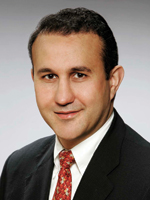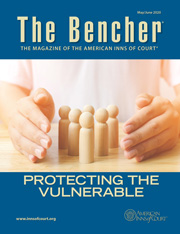Legal Ethics and Lawyer Mobility
The Bencher—May/June 2020
By Francis G.X. Pileggi, Esquire

 Very recent formal ethics opinions of the American Bar Association (ABA) and the State Bar of California address the ethical obligations of law firms and lawyers when a lawyer leaves one firm to join another. This short ethics column, now in its 24th year, will cursorily cover the principles of legal ethics addressed in the ABA and California formal ethics opinions and how they balance the interests of lawyers and law firms with the paramount interest of clients, which in some instances may supersede the terms of an agreement between a lawyer and a law firm.
Very recent formal ethics opinions of the American Bar Association (ABA) and the State Bar of California address the ethical obligations of law firms and lawyers when a lawyer leaves one firm to join another. This short ethics column, now in its 24th year, will cursorily cover the principles of legal ethics addressed in the ABA and California formal ethics opinions and how they balance the interests of lawyers and law firms with the paramount interest of clients, which in some instances may supersede the terms of an agreement between a lawyer and a law firm.
ABA Formal Opinion 489, published on December 4, 2019, by the ABA’s Standing Committee on Ethics and Professional Responsibility, is titled Obligations Relating to Notice When Lawyers Change Firms (Formal Opinion 489). Earlier this year, the State Bar of California’s Committee on Professional Responsibility and Conduct issued Ethics Opinion 2020-201 (California Opinion 2020-201), which emphasizes that “the client’s interests come first” and that those interests supersede any duty a departing lawyer may owe a law firm, based on the overarching principle of a client’s right to the counsel of its choice.
A) Basic Rules
Model Rules of Professional Conduct 1.3, 1.4, and 3.2 serve as a starting point for an analysis of a lawyer’s basic obligations to a client in this context. ABA Formal Opinion 489 is based on the Model Rules, which are in some instances different from state rules.
Model Rule 1.3 requires a lawyer to “act with reasonable diligence and promptness in representing a client.” Model Rule 3.2 similarly requires that a lawyer “make reasonable efforts to expedite litigation consistent with the interests of the client.” Model Rule 1.4 requires lawyers to communicate relevant information to clients in a timely manner.
B) ABA Formal Opinion 489 and California Opinion 2020-201
ABA Formal Opinion 489 interprets Rule 1.4 to prevent law firms from restricting the ability of a lawyer to provide prompt notification to clients about the lawyer’s updated details at her new firm, once the old firm has been notified. California Opinion 2020-201 interprets the California version of Model Rule 1.4 to require a lawyer to notify her clients about the departing lawyer’s new contact information. In addition, the California version of the rule is interpreted by California Opinion 2020-201 to view any attempt by agreement or otherwise to prevent a departing lawyer from contacting a client as a potential violation of Rule 1.4.
ABA Formal Opinion 489 opines that a law firm cannot prohibit a departing lawyer from soliciting firm clients if the firm and the departing lawyer cannot promptly agree on the terms of a joint letter. See Restatement of the Law Third, The Law Governing Lawyers § 9(3)(a)(2000). Formal Opinion 489 also provides that departing lawyers need not wait to inform clients of the fact of their pending departure, provided that the firm is informed at the same time.
Model Rule 5.6 prohibits restraints on a client’s choice of counsel and provides that a lawyer shall not participate in an agreement with a law firm that restricts the right of a lawyer to practice after termination of the relationship. Formal Opinion 489 interprets Rule 5.6, based on case law, as supporting the conclusion that lawyers cannot be held to either a fixed notice period or a minimum period to work at a firm before leaving, especially if it would impinge on duties to the client. Moreover, a law firm may not impose conditions on a lawyer’s departure that would have a negative impact on a client’s choice of counsel or serve as a “financial disincentive to a competitive departure” regarding restrictions on providing notification to clients. The ABA describes the risk of violating Rule 5.6(a) by “thinly disguised restrictions” related to notice provisions that are not in the best interests of the client in terms of providing updated information to the client.
The ABA also counsels in its latest formal opinion on this topic that a lawyer must have access to adequate firm resources needed to competently represent the client during any interim period before the departure of the lawyer. For instance, the firm cannot require a lawyer to work from home or remotely or deprive the lawyer of appropriate necessary assistance from support staff and other lawyers necessary to represent clients competently. The ABA opinion concludes by advising that requiring a lawyer to stay at the firm must account for the departing lawyer’s offer to cooperate post-departure.
A related topic beyond the scope of this short column is the potential conflict of interest that may arise in litigation when a lawyer who switched firms represents clients in ongoing litigation involving lawyers from her former firm who represent an adverse party. See Wayne County Employees’ Retirement System v. Mavenir, Inc., C.A. No. 18-1229-CFC-SRF (D. Del. Aug. 1, 2019). In Wayne County, the court denied a motion to disqualify plaintiff’s counsel, a lawyer who used to work for the firm representing the defendants. Before the case was filed the lawyer joined the firm representing the plaintiff. The law firm representing the defendants asserted that their former colleague had a conflict of interest—which should be imputed to his current firm representing the plaintiff. See Rule 1.10.
The firm that filed the case with the new lateral attorney soon withdrew from the case, but defendants sought to disqualify new plaintiff’s counsel. The court refused to adopt a per se rule of double imputation, which would provide that if one co-counsel is disqualified for ethical reasons, all co-counsel must be barred from representation. Rather, the court reviewed several factors, including whether any confidences were shared with present counsel. There was no showing of any confidential data from the prior representation included in the complaint. Also, the odds of the motion being granted were not helped by a delay of seven months before the motion was filed.
In sum, careful planning, kind cooperation, and familiarity with the applicable ethical rules should help to avoid any “unforced errors” in the sensitive circumstances involving the increasingly common phenomenon of lawyers at all levels of experience changing firms several times during their careers.
Francis G.X. Pileggi, Esquire, is a litigation partner at Eckert Seamans Cherin & Mellott, LLC in Wilmington, Delaware. He comments on key corporate and commercial decisions and legal ethics topics at www.delawarelitigation.com.